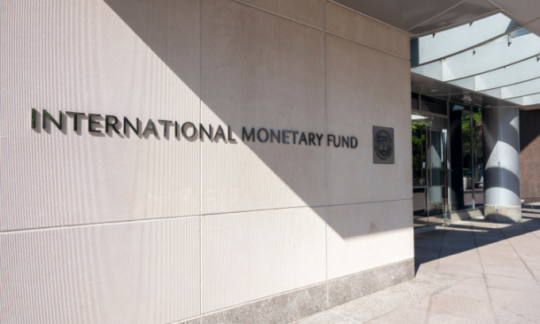The IMF wants Australia to raise interest rates - so what will happen?

As borrowers nervously await news of an interest rate hike, the International Monetary Fund (IMF) has weighed in, advising the Reserve Bank of Australia (RBA) that it should go ahead and raise rates again. So who exactly are they, why is an overseas organisation giving guidance to the Aussie central bank, and what’s the likely outcome of this interest rate call?
What is the IMF?
Sadly, the IMF we’re talking about here is not the same as the Impossible Mission Force that gives Tom Cruise his orders in the long-running movie series. This IMF is a global financial organisation that operates within the United Nations (UN), headquartered in Washington D.C. With 190 member countries, the organisation’s stated aims are to “foster global monetary cooperation, secure financial stability, facilitate international trade, promote high employment and sustainable economic growth, and reduce poverty around the world.”
The IMF has various functions, which range from providing policy advice to its member countries to providing loans and financial aid to those member countries, to assisting governments in developing and implementing their own economic policies. The IMF is funded by its member countries, who pay into it via a quota system. The amount that a country pays is variable, and based on its individual position in the world economy. Currently, the IMF’s lending capacity for its member countries sits at around $US925 billion.
What did the IMF say about interest rates in Australia?
As Aussie borrowers will be acutely aware, interest rates rose sharply in Australia throughout the latter half of 2022 and the beginning of 2023, as the RBA raised the cash rate in an attempt to keep pace with rising inflation. While the rate rises have paused the last few months, new RBA governor Michelle Bullock has warned that we may not have seen the end of them, and this week, the IMF weighed in on the subject.
Assessing Australia’s current financial position, the IMF’s outlook was generally positive, but they nonetheless urged the RBA to raise rates further in an attempt to bring inflation into line. “Although inflation is gradually declining, it remains significantly above the RBA’s target and output remains above potential,” the IMF wrote.
“Staff therefore recommend further monetary policy tightening to ensure that inflation comes back to the target range by 2025 and minimise the risk of de-anchoring inflation expectations.”
The most recent figures show that the inflation rate in Australia was 5.4% in the September quarter – this is below the peak of 7.8% in the December quarter of 2022, but still well above the RBA’s target range of 2-3%.
While urging the RBA to raise rates, the IMF also noted that the central bank is not solely responsible for bringing inflation into line. The agency also urged federal and state governments in Australia to begin rolling out public investment projects in Australia at a “more measured and co-ordinated pace” to alleviate inflationary pressures.
Does the IMF have power in Australia?
The IMF does not have a direct say in Australia’s monetary policy, and when it comes to the matter of the cash rate, the decision of whether to lower, hold or raise it rests with the RBA alone. That said, the IMF’s words are likely to hold some sway with the RBA board, and could further justify the rate rise that has already been flagged by the central bank.
Federal Treasurer Jim Chalmers has indicated his approval of the IMF’s statement, saying that it supports his government’s budgetary strategy. “This report welcomes the government’s broader economic agenda, including investments in cheaper and cleaner energy, cheaper childcare, and skills and vocational training, as well as policies to boost housing supply,” he said.
Will interest rates go up?
In her first speech as RBA governor, Michelle Bullock said that the central bank would raise the cash rate again if the risk of rising inflation became too great. “It is possible that this can be done with the cash rate at its current level but there are risks that could see inflation return to target more slowly than currently forecast,” she told the Commonwealth Bank Global Markets Conference.
“The board will not hesitate to raise the cash rate further if there is a material upward revision to the outlook for inflation,” said Bullock. “At the same time, the board is mindful that growth in demand and the rate of inflation have been moderating, and that there are long lags in the transmission of monetary policy.”
Cover image source: Atstock Productions/Shutterstock.com
This article was reviewed by our Editor-in-Chief Nina Rinella before it was updated, as part of our fact-checking process.

Alasdair Duncan is Canstar's Deputy Finance Editor, specialising in home loans, property and lifestyle topics. He has written more than 500 articles for Canstar and his work is widely referenced by other publishers and media outlets, including Yahoo Finance, The New Daily, The Motley Fool and Sky News. He has featured as a guest author for property website homely.com.au.
In his more than 15 years working in the media, Alasdair has written for a broad range of publications. Before joining Canstar, he was a News Editor at Pedestrian.TV, part of Australia’s leading youth media group. His work has also appeared on ABC News, Junkee, Rolling Stone, Kotaku, the Sydney Star Observer and The Brag. He has a Bachelor of Laws (Honours) and a Bachelor of Arts with a major in Journalism from the University of Queensland.
When he is not writing about finance for Canstar, Alasdair can probably be found at the beach with his two dogs or listening to podcasts about pop music. You can follow Alasdair on LinkedIn.
The comparison rate for all home loans and loans secured against real property are based on secured credit of $150,000 and a term of 25 years.
^WARNING: This comparison rate is true only for the examples given and may not include all fees and charges. Different terms, fees or other loan amounts might result in a different comparison rate.
 Owner occupied
Owner occupied
 50% min deposit
50% min deposit
 Redraw facility
Redraw facility
Try our Home Loans comparison tool to instantly compare Canstar expert rated options.





